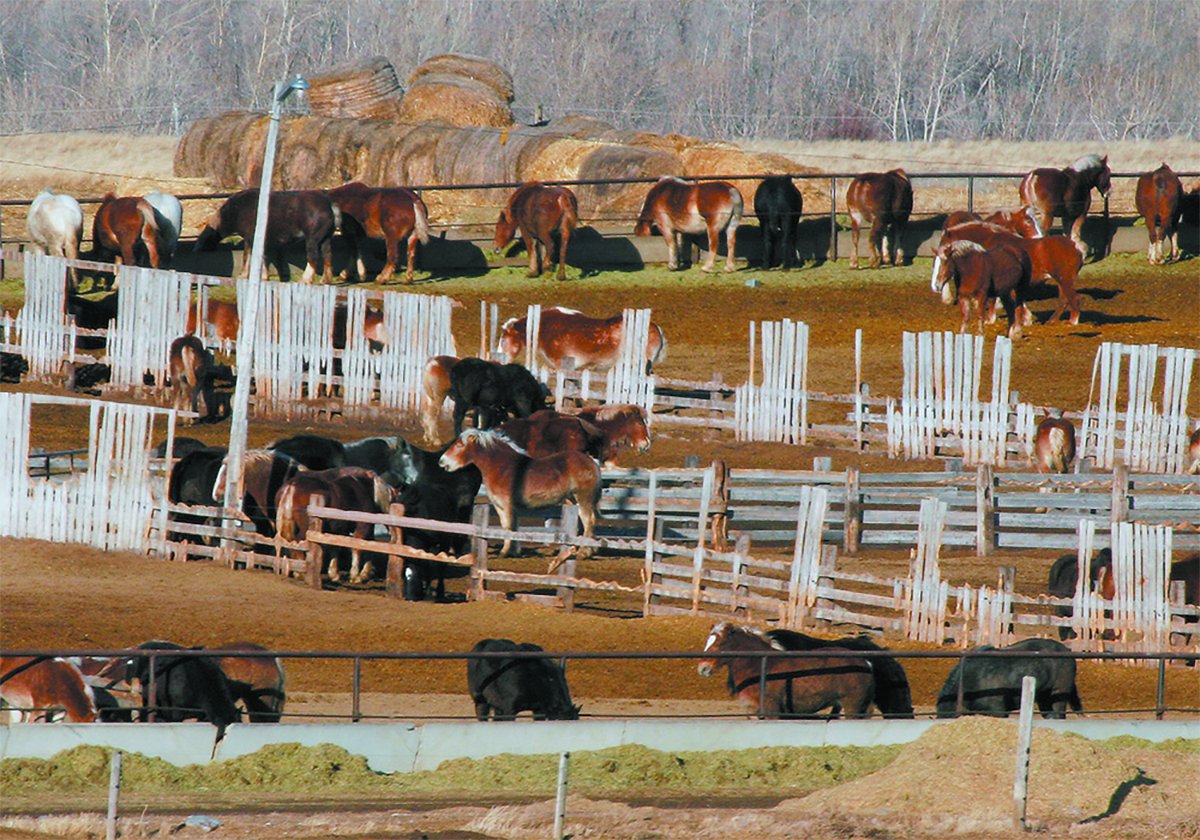Nathan Powell’s father was a blacksmith, but the son never struck the hammer to the anvil until he was an adult.
“I never shod a foot till I went to Olds College,” said the 2002 Canadian blacksmithing champion.
After learning his trade at college, he opened his own business in 1993 following a three-year apprenticeship.
He practises a “have forge, will travel” business from his base at Water Valley, west of Calgary. Unlike many of his colleagues, he does not specialize in a single type of horse, but serves a variety of clients within an hour of his home base.
Read Also

Canada’s slaughter horse industry lacks transparency
The lack of clear reporting and public access to data keeps the industry largely hidden, leaving questions about humane treatment and traceability unanswered.
Clientele and horses are always changing, but the work remains much the same. Powell has worked on ranches where $75,000 might buy a string of 20 horses or a single champion.
The work is physically demanding, but he hasn’t suffered serious injuries. As an apprentice, he developed calluses and faced pain in his upper thighs, but has since developed the well-muscled forearms and back that are a blacksmith’s trademark.
“It doesn’t hurt at all any more,” he said.
Every day is busy as the province’s horse industry continues to grow.
He also finds time for weekend competitions to hone his skills and meet other farriers.
As a champion of the Canadian Horseshoeing Competition held in Calgary, he won a berth on the five-member national team that has taken him to Great Britain and across the United States. He has made the team four times.
Powell entered the Calgary competition this spring but opted out of accepting a place on the team.
“This is a fairly relaxed contest, but Calgary (Stampede) or the American farriers’ competition is an endurance test,” he said.
The Canadian competition takes place over three days and requires the contestants to display their skills with manufactured shoes and ordinary horses. Contestants accumulate points from each class and the highest aggregate score wins.
International competition is more demanding because of the level of detailed work in a timed event. Higher level events require long hours of practice, studying the specifications outlined for making a shoe from a straight bar of steel.
Forging a custom-made shoe is Powell’s most challenging event.
“It’s harder to do because I shoe horses every day. I don’t do much forging work,” he said.
He welcomed the challenge, however, because these events have raised the quality standards for his industry.
Marshall Illes, chair of the national contest and Stampede farrier committee, said the knowledge base and ability of Canadian farriers has increased in the last 25 years. Contests provide training and an exchange of ideas.
“This models and mirrors what they do in their job,” said Illes at the competition held March 21-23.
The national event requires individuals to fit horses with forged shoes, as well as a keg competition in which they must fit a prefabricated shoe to the horse.
This year, 22 competitors from six provinces and the United States participated.
All are full-time professional farriers. As the horse industry grows, the demand for people in this 2,000-year-old craft grows.
“If you are good, you will always be busy,” said Illes, who shoes hunter-jumpers.
Horse owners do not always appreciate the importance of a good farrier who must have extensive knowledge of hoof trimming and horse physiology before a shoe ever goes on a foot.
The industry is not regulated but certification is available through the American Farrier Association, supported and recognized by Canadian regional associations.
“It is the last free-market job that is still out there,” Illes said.
Potential farriers can start their career at Olds College, where they may be selected to attend championships as helpers and meet potential employers.
“Apprenticeship is the most effective way of building a long-term industry,” Illes said.
Austin Edens of Graham, Texas, was the 2003 winner of this year’s Canadian championship.
The 23 year old’s awards include the U.S. national championship and overall highpoint in 2001 and 2002, North American challenge cup in 2002, world forging champion in 2001, and the reserve champion in the United Kingdom therapeutic shoeing contest in 2001.
Team Canada members are Adam McQueen of Flesherton, Ont., Jeri Sparshu of Didsbury, Alta., Andrew Carruthers of Morin Heights, Que., Marc McGreevy of Woodville, Ont., and Laird Gordon of Williams Lake, B.C.

















